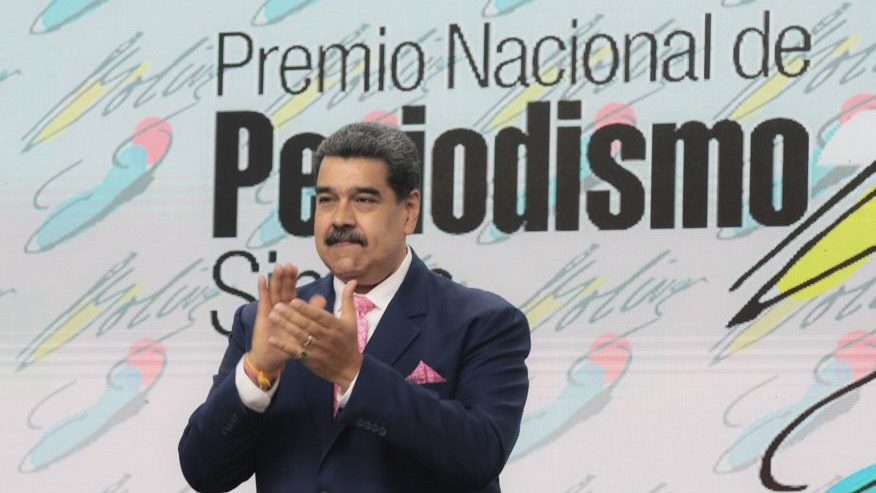The government of Venezuela welcomed a second high-level US delegation that included Bogotá-based Ambassador James Story and US envoy on hostage affairs Roger Carstens, President Nicolás Maduro confirmed Monday.
Although US officials tried to characterize the visit as being driven by the Biden administration’s efforts to see a handful of US citizens released from Venezuelan custody, the Venezuelan president was explicit that the meeting was a follow-up to previous bilateral talks in Caracas in March. The delegation was met by ranking Chavista politician and National Assembly President Jorge Rodríguez on Monday evening.
“Jorge Rodríguez is welcoming an important US government delegation […] to follow-up on the bilateral agenda between the US government and the Venezuelan government,” said Maduro Monday night during a televised broadcast.
Early press reports indicated that the trip was a “welfare visit” focused on the detained US citizens. Bilateral talks in March led to the release of US citizens Gustavo Cardenas and Jorge Fernández, with the State Department similarly then denying that their release was tied to a deal concerning Venezuelan oil.
However, the US delegation’s visit comes amidst an ongoing struggle by US and European leaders to find a solution to a brewing energy crisis driven by the imposition of sanctions on Russia following the invasion of Ukraine.
Maduro made explicit reference to France’s call for Venezuela and Iran to return to “Western” oil markets as a means of alleviating the supply squeeze and bringing down energy prices globally. Venezuela and Iran signed a 20-year cooperation agreement during a recent Maduro trip.
G7 leaders recently agreed to study potential price caps on Russian oil and gas in order to ensure a consistent supply of oil while simultaneously limiting Moscow’s income from sales. The proposal is viewed by analysts as unlikely to succeed, meaning other oil-exporting nations like Venezuela will continue to be given special consideration as energy prices are expected to continue to rise.
The Venezuelan government has insisted that it is willing to resume oil shipments provided unilateral sanctions are lifted. The Venezuelan oil industry has been crippled by US coercive measures, including financial sanctions, an oil embargo and secondary sanctions. Caracas is presently producing less than a million barrels per day despite having the world’s largest reserves.
Nonetheless, Venezuela is well positioned to ramp up production to meet global demand with countries such as the UAE and Saudi Arabia reportedly unable to ramp up production quickly.
When asked Tuesday if the meeting was tied to a potential oil deal, US National Security Advisor Jake Sullivan reiterated Washington’s position that any sanctions relief would be tied to progress in talks between the Venezuelan government and the US-backed opposition. Sullivan claimed that a recent license to allow Italy’s Eni and Spain’s Repsol to resume oil-for-debt swap deals with Venezuela’s state oil company PDVSA was driven by the US’ desire to see talks restart.
The negotiations held in Mexico City between the Maduro administration and the hardline opposition were suspended in October 2021 following Venezuelan diplomat Alex Saab’s arrest in Cape Verde and his extradition to Florida to face money laundering charges. The Venezuelan government has blasted the case as “politically motivated.”
Maduro pledged to restart the dialogue process with the opposition following that first-contact meeting with US officials and there was widespread speculation that a deal that would see the US lift its oil sanctions on Venezuela was in the cards. However, those expectations were dashed in light of a bipartisan backlash inside the US against a potential détente.
US President Joe Biden’s strategy concerning Venezuela recently came under heavy criticism from regional leaders such as Mexico’s Andrés Manuel López Obrador after Biden opted to exclude Venezuela, Cuba and Nicaragua from the Summit of the Americas, leading the Mexican president to boycott the event along with several others.
Venezuela broke off diplomatic relations with the US in 2019 after the latter recognized opposition figure Juan Guaidó as “interim president.” However, direct talks with the Venezuelan leader have undermined the US’ strategy in Venezuela and its support for Guaidó, whom the Biden administration insists they still recognize as “interim president.”
With no legitimacy inside Venezuela and unable to exercise any actual governance power, Guaidó relies almost exclusively on foreign backing to maintain his position. The former lawmaker and his allies suffered another setback after Colombians elected Gustavo Petro in recent presidential elections, leaving the hardline opposition leader without a key ally.
According to AP, US Ambassador Story met for two hours with Juan Guaidó upon his arrival in Caracas. Guaidó was snubbed by US officials in their last visit.
Under the leadership of right-wing President Iván Duque, Colombia played a key role in US-led destabilization efforts in Venezuela. Maduro and President-elect Petro spoke by phone following his election victory where they discussed the normalization of diplomatic relations.
“A new stage of peace, brotherhood and cooperation with Colombia seems to be on the horizon,” said Maduro on Monday.
This article was edited by and first published at Venezuela Analysis.





